- Home
- Edward Rutherfurd
New York Page 3
New York Read online
Page 3
Normally, even if Margaretha heard that he was at the wharf, she’d know he needed to deal with business at the warehouse first, and she’d wait for him at the house. He hadn’t counted on her being down at the fort.
Well, he’d keep his promise to his daughter, but he’d have to be careful.
“Come, Pale Feather,” he said.
It wasn’t easy keeping an eye out for his wife while he showed Pale Feather around. But she seemed quite happy. He found he was quite proud of the town. You couldn’t deny that Stuyvesant had improved the place. The broad, muddy bankside had been partly cobbled. Even in the busiest area, close to the market, the houses with their high, stepped gables had spacious, well-tended gardens behind. Moving up the east side, they crossed over the small canal and came to the city hall, the Stadt Huys. This was a big building with a central doorway, three rows of windows, another two in the steep mansard roof, and a widow’s walk on the roof above. It stood together with a group of other buildings, like so many Dutch merchants, gazing stolidly out at the East River. In front of the Stadt Huys was a double stocks for punishing malefactors. He had to explain to Pale Feather how people were locked in the stocks to be humiliated.
“Over there,” he pointed along the bank, “we also have a gallows where people are choked to death with a rope for more serious offenses.”
“My people have no such custom,” she said.
“I know,” he answered kindly. “But we do.”
They had just paused in front of a tavern where some sailors were drinking when from round the corner, strolling toward them in her loose gown, and with a pipe in her hand, came Margaretha van Dyck.
Margaretha gazed at her husband and the little girl. It was only a few minutes since Meinheer Steenburgen’s wife had told her that van Dyck was in town. It might have been her imagination, but when the woman had imparted this news, Margaretha thought she’d seen a little glint in her eye—the sort of look one might give to a wife whose husband has been seen with another woman—and this had put her on her guard.
Would Dirk do such a thing to her, in public? A sudden cold fear had seized her, but she had controlled herself, and smiled at the woman as though she’d been quite expecting her husband that day anyway.
And here he was with an Indian girl. Not a mistress, anyway. But a girl who looked … a little pale for a pure Indian, perhaps.
“You’re back,” she said, and embraced him briefly. Then she stepped back.
“Yes. We were unloading at the storehouse.”
Did he look nervous? Perhaps.
“Your trip was successful?”
“Very. So many pelts I needed an Indian canoe as well, to get them all back.”
“That’s good.” She stared at Pale Feather. “Who’s the girl?”
Dirk van Dyck glanced at Pale Feather and wondered: Did she understand what they were saying? He suddenly realized that he did not know. Some of the Indians spoke Dutch, but he had always spoken to his daughter in her native tongue. He said a silent prayer.
“She came with the Indians in the canoe,” he answered coolly. “One of the Turtle clan.” Among the local Indians, the clan, or phratry, passed down the female line. You belonged to your mother’s clan. “I am friendly with the Turtle clan.”
Margaretha eyed Pale Feather thoughtfully.
“You know the mother?”
“No.” Van Dyck shook his head. “She’s dead.”
“The child looks half-caste.”
Had she guessed? He felt a stab of fear, and quickly fought it down.
“I think so too.”
“The father?”
“Who knows?” He shrugged.
His wife sucked on her pipe.
“These Indian women are all the same.”
It was strange, van Dyck considered. Despite their Calvinistic Church, Dutch women quite often had lovers before they were married, and it was tolerated. But because some of the Indian women, whose people had been dispossessed by the white man, had been reduced to selling their bodies at the trading ports for small sums of a currency they did not understand, his wife could believe that every Indian woman was a common whore.
“Not all,” he said quietly.
“She’s a pretty little thing.” Margaretha blew smoke out of the side of her mouth. “It’s a pity their looks never last.”
Was she right? Would his little daughter’s looks fade away even in his own lifetime?
He saw that Pale Feather was staring ahead, looking numb. Dear God, had she understood what they were saying? Or had she divined their meaning from their tone of voice?
Dirk van Dyck loved his wife. Not as much as he should, perhaps, but she was a good woman in her way, and a fine mother to their children. He supposed that no marriage was perfect, and whatever the shortcomings of his own, they were as much his fault as hers. He had been faithful to her, mostly—apart from Pale Feather’s mother, whom he regarded as a special case.
Anyway, there was no reason why Margaretha should guess that Pale Feather was his daughter. No reason, except her woman’s instinct.
“Don’t bring her to the house,” said Margaretha quietly.
“Of course not,” he heard himself say.
She’d guessed. He was almost certain of it. Was she going to accuse him when he got home? Was she going to make a scene? Perhaps. But then quite likely he’d deny it, and that would leave her looking like a fool. She was too proud for that.
He wished he had not hurt her though.
“Send her away,” said Margaretha firmly. “Your children are waiting for you.” She turned to go.
He certainly couldn’t blame her. Indeed, he admired her. She was behaving with dignity, holding her family together. But then he looked at Pale Feather.
She was still staring ahead, but the blank shock on her face said it all. She did not need to understand their words. Their tones and their looks said it all. The magical time he’d promised her was turning into hurt and misery. He hadn’t meant to, but he’d betrayed her. A great wave of remorse washed over him. He couldn’t leave her like this.
Margaretha was moving away. Whatever pain he’d caused his wife, it was already done. Besides, she was a grown woman, and strong. Whereas the girl at his side was an innocent child. He thought quickly.
“I still have business to finish, Greet, after the Indians go,” he called after her. “I have to go up to Smit’s bouwerie. You remember, a quarter of the pelts are for him.” It was quite true that he had to ride up to see the farmer, though he hadn’t been planning to go today. “Tell the children I shall be home tomorrow.”
“And when do you plan to leave again?” She had turned.
“Leave?” He smiled. “Not for months.”
Margaretha nodded. Was she mollified?
“Until tomorrow, then,” she said.
For a little while, neither he nor Pale Feather spoke. He wanted to put his arm round her, to comfort her, but did not dare. So they walked along the street in silence, until she asked: “That is your wife?”
“Yes.”
“Is she a good woman?”
“Yes. A good woman.”
They went on a few paces.
“Are you sending me back now?”
“No.” He smiled at her. “Come with me, my daughter,” he said.
It took him less than an hour to get ready. He sent one of his men to get his horse. He also bought some food, and two blankets. Then, after giving the Indian men their instructions, he and Pale Feather set out.
The main route out of New Amsterdam was a broad thoroughfare that began at the market in front of the fort and ran up the western half of the town to the wall.
Van Dyck rode slowly. Pale Feather was content to walk along beside him. The Dutch houses soon gave way to pleasant allotments and orchards. They reached the town’s wall and went out through the gate with its stone bastion. The broad way continued straight for a few hundred yards, past a cemetery and a mill. The track then led to the
right. On the East River side they passed a small tobacco plantation and a swamp. Soon after, on their left, they came to a big pond. And from there the track led north all the way to the top of the island.
Manhattan Island was a strange place: only a mile or two across, but thirteen long miles from top to toe. A wilderness of marsh, meadow and woodland, dotted with hillocks and outcrops of bedrock, it had been a magnificent Indian hunting ground. Indeed, the very track they were taking had long been an Indian trail.
The Manates had been the name of the Indians who’d occupied the island. But they were just one of so many groups of Algonquin-speaking people who had settlements in the region. There were the Canarsee Indians over the East River in Brooklyn; across the harbor, by the broad piece of land the Dutch called Staten Island, dwelt the Raritan. Starting up the great river to the north one encountered the Hackensack and the Tappan. There were a score of names. From the start, the White Men had noticed that all these folk were handsome: the men tall and graceful, the women with finely cut features. As van Dyck gazed down at the girl walking beside him, he felt proud.
But few of the White Men bothered to study the Indians. Would he have done so himself, he wondered, if it hadn’t been for the girl’s mother?
Even the settlement on Manhattan had been born of confusion. When the local Indians had taken a parcel of goods from Pierre Minuit, their understanding had been clear: the White Men were giving the usual gift for the right to share their hunting grounds for a season or two. In European terms, it might be thought of as a rent. Since Indians did not personally own land, the idea that Minuit was buying the land in perpetuity would never have occurred to them. Not that the good burghers of New Amsterdam would have cared if they had understood, van Dyck considered wryly. The Dutch idea of land entitlement was practical: if you settled it, you owned it.
No wonder there had been friction down the years. Aggrieved Indians had attacked. Outlying settlements upriver had been abandoned. Even here on Manhattan, two Dutch hamlets—Bloomingdale, a few miles up the west side, and Harlem in the north—had suffered severe damage.
But always, in the end, the White Man took more land. Vast tracts upriver were granted to Dutch patroons. A Dane called Bronck had paid the local Indians to vacate his huge parcel just north of Manhattan. Some small Indian groups were still eking out an existence on Bronck’s land and the wilder parts of Manhattan. That was all.
They had gone about five miles along the trail, and reached an area of woodland in the center of the island, when van Dyck decided it was time to eat. Taking a small path that led westward, they went past dells and outcrops of bedrock until they came to a glade where wild strawberries sprinkled the grass. There van Dyck dismounted, and tethered his horse to a sapling. Tossing a blanket on the ground, he told Pale Feather to sit.
“Now,” he smiled, “let us see what your father has brought.”
It had been easy enough to buy corn porridge, dried raisins, hickory nuts and some pieces of smoked meat—the mixture that the Indians called “pimekan.” Also, Dutch coleslaw and rye bread. But he had also bought some Dutch treats—chocolates and cookies—which would please any child. Sitting side by side, father and daughter shared their meal contentedly. She had just eaten her first cookie when she turned to him and asked: “Do you think I should get a tattoo?”
Van Dyck paused. What an enchanting figure she was. Her little feet were encased in moccasins, her long, dark hair tied back with a thong. Like most Indian girls of her age, in the warm months of the year, she covered only the lower part of her body with a deerskin skirt that reached to her knees. Her chest was bare, except for the little hanging pendant; her breasts had not started to grow yet. Her skin—protected from the sun and from mosquitoes by a light smearing of raccoon oil—was perfect. When she was older, she’d probably put a little red paint on her cheeks and darken the area round her eyes. But until then, he hoped she would remain exactly as the perfect little girl she was. Not that the Indian women went in for big tattoos like the men. But even so …
“I think you should wait,” he said carefully, “until you are married, and then choose a tattoo that will be pleasing to your husband.”
She considered, and nodded.
“I will wait.”
She sat quietly, but it seemed to him that she was thinking about something. After a while she looked up at him.
“Did you ever kill a bear?”
The rite of passage. To become a man, among her people, every boy had to kill a deer—and rightly so. It was proof that he could feed a family. But to prove that he was truly a brave, he must accomplish the far more difficult and dangerous task of killing a bear. When a man had done that, he was truly a warrior.
“I have,” he answered. Seven years ago, out in Iroquois territory, the local Indians had warned him that some men had been attacked recently on the mountain path he was to travel. Bears did not usually attack, but when they did, they were formidable. He had gone prepared. But when the beast suddenly appeared and came at him with a rush, he had been lucky to kill it outright with a single shot from his musket. “It was a black bear,” he told her, “in the mountains.”
“You killed it alone?”
“Yes.”
She said nothing, but he could see that she was pleased that her father was a proper warrior.
It was still early afternoon. The sunlight was cascading through the leaves onto the grassy banks where the wild strawberries grew. He felt at peace, and leaned his head back. The plan that he had so suddenly formed was to spend all day with her. In the morning, the Indians and the canoe would meet them at the north end of the island and take Pale Feather back upriver. Then he could go back by Smit’s bouwerie and be home long before dark. It was a good plan, and they had plenty of time. He closed his eyes.
He might have dozed a few minutes when, sitting up, he realized that Pale Feather had disappeared.
He looked around. No sign of her. He frowned. Just for a foolish moment, he felt a little pang of fear. What if something had happened to her? He was about to call her name when a tiny movement caught his eye. About a hundred yards away in the trees, a deer had raised its head. Instinctively, he kept still, and silent. The deer stared in his direction, but did not see him. The deer lowered its head.
And then he saw Pale Feather. She was away on the right, upwind of the deer, standing behind a tree. She put her finger to her lips, signaling: Silence. Then she stepped out from her concealment.
Van Dyck had often seen the stalking of the deer; he’d done it himself. But never like this. As she carefully slipped between the trees, she seemed lighter than a shadow. He listened for the softest sound of moccasin on moss. Nothing. As she worked her way closer, she sank down almost to a cat’s crouch—slower and slower, each pace forward hovering, weightless as a whisker, over the ground. She was behind the deer now, only fifteen yards away … then ten … five. Still the deer did not sense her. He couldn’t believe it. She was behind a tree, three paces from the animal, which was cropping the grass, head down. She waited. The deer raised her head, paused, lowered her head again. And Pale Feather sprang. She went through the air like a flash. The deer started, leaped, and raced away through the trees—but not before, with a cry of joy, the girl had touched her.
Then, laughing, she ran over to her father, who scooped her up into his arms. And Dirk van Dyck the Dutchman realized that he never had been, and never would be, as proud of any child as he was of his elegant little Indian daughter at that moment.
“I touched her,” she cried with glee.
“You did.” He hugged her. To think that he should be the father of a child who was perfect. He shook his head in wonderment.
They sat together for a little while after that. He did not say much, and she did not seem to mind. He was wondering whether it was time to move on when she turned to him.
“Tell me about my mother.”
“Well,” he considered. “She was beautiful. You are like her.”
>
He thought of their first meeting at the camp on the sound where her people used to collect shellfish in summer. Instead of the usual long-houses, her people pitched wigwams by the shore. They would dry the shellfish, scrape them out of their shells, bury the shells and store the dried oysters, mussels and clams to be made into soup at a later date. Why should he have been so struck by this particular young woman? Because she was unattached? Perhaps. She had been married but lost her husband and her child. Or was it something, a special light of curiosity in her eyes? That too. He had stayed two days there, spent a whole evening talking with her. The attraction had been mutual; but he had business to attend to and nothing more than conversation had passed between them before he had continued on his way.
A week later, he had come back.
It was during the time he had spent with her that he had truly come to know the Indians. He came to understand also why some of the first Dutch settlers, having no women of their own, had married Indian women and afterward refused even the most powerful religious persuasion to give them up. She was lithe as a wild animal, yet if he was tired, or angry, she would be gentle as a dove.
“You loved her very much?”
“Yes. I did.” It was true.
“And then you had me.”
It was the custom of her people that there was always a place for such extra children in the extended family of the mother’s clan.
“If you had not had a wife in the White Man’s trading post, you would have married my mother, wouldn’t you?”
“Of course.” A lie. But a kindly one.
“You always came to see her.”
Until that terrible spring, three years ago, when he arrived at the village and learned that Pale Feather’s mother was sick. “She was in the sweat lodge yesterday,” they told him, “but it did no good. Now the medicine men are with her.”

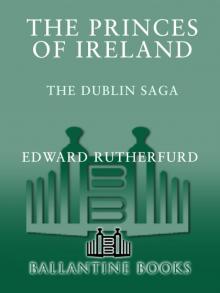 Princes of Ireland
Princes of Ireland New York
New York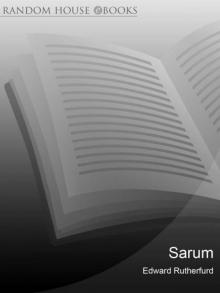 Sarum
Sarum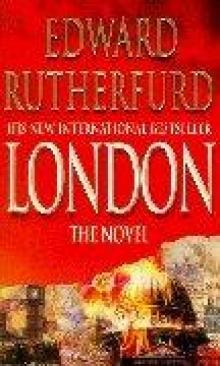 London
London Russka: The Novel of Russia
Russka: The Novel of Russia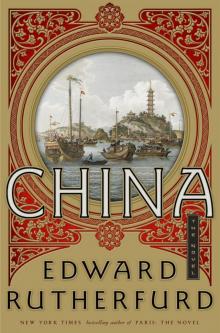 China
China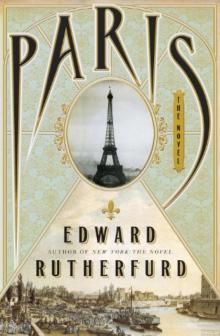 Paris
Paris The Forest
The Forest Russka
Russka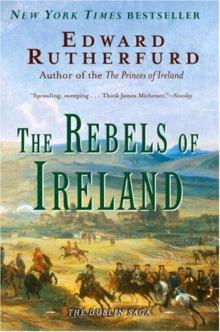 The Rebels of Ireland: The Dublin Saga
The Rebels of Ireland: The Dublin Saga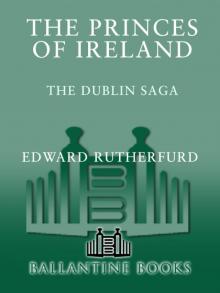 The Princes of Ireland
The Princes of Ireland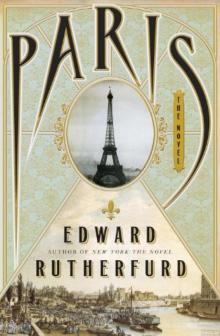 Paris: The Novel
Paris: The Novel